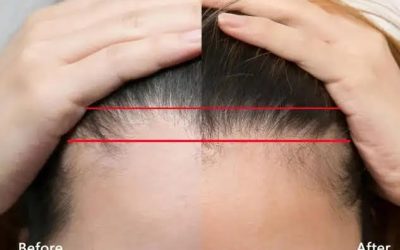Rosemary, an evergreen shrub with needle-like leaves, has long been used for culinary and medicinal purposes. It’s also likely that you’ve heard about the benefits of rosemary for hair loss. In recent years, this plant, specifically its oil extract, has become popular amongst people searching for ways to regrow their hair.
But is it effective? Moreover, is it safe to use it? Let’s look at the research behind rosemary oil extract and explore its potential as a treatment for thinning hair.
What Is Rosemary Oil Extract?
For medicinal or therapeutic purposes, rosemary is commonly used in the form of oil extract. It is obtained through steam distillation and used for various purposes, including aromatherapy, cooking, and personal care.
In the context of hair care, rosemary oil is used as a treatment for hair loss, as well as to promote hair growth and improve the overall appearance of hair. Some incorporate it into their hair care routine by adding a few drops to a carrier oil, such as olive oil or coconut oil, and massaging it into the scalp. Others use hair loss shampoos and conditioners or hair care products that contain rosemary oil extract.
How Does Rosemary Help With Hair Loss?
Rosemary is believed to have several properties that make it helpful for hair loss. Some of these include:
Anti-Inflammatory and Antiseptic Properties
Rosemary has anti-inflammatory and antiseptic properties that can help reduce scalp irritation and prevent hair loss.
Stimulation of Blood Circulation
It is believed to stimulate blood circulation in the scalp, which can help promote hair growth.
DHT-Blocking Properties
Rosemary contains rosmarinic acid, believed to help prevent DHT (dihydrotestosterone) from binding to the scalp and causing hair loss.
Antioxidant Properties
Rosemary is a rich source of antioxidants, which can help protect the scalp and hair from damage caused by free radicals.
Nourishing and Conditioning Properties
Rosemary oil is often used as a hair conditioner because it can help nourish and strengthen the hair, making it less prone to breakage and thinning.
In summary, rosemary oil extract is believed to have several properties that make it beneficial for hair care. These include its ability to stimulate blood circulation, improve the scalp’s health, and promote hair growth. Some people believe that rosemary oil’s antiseptic and anti-inflammatory properties help reduce scalp irritation and prevent hair loss.
Is Rosemary Effective for Hair Loss?
Rosemary oil has been traditionally used for hair growth and to prevent hair loss. The use of this herb for hair care can be traced back to ancient Greece and Rome, where it was utilised as a remedy for dandruff and for promoting hair growth.
But is it really effective in treating hair loss? Moreover, does it support hair and scalp health? Well, some studies have shown that rosemary oil may have potential benefits for hair growth.
In fact, the results in one study which compared the effects of rosemary oil with those of minoxidil, a clinically proven hair loss medication in treating androgenetic alopecia (AGA), were promising. After six months of treatment, the researchers found that rosemary oil was as effective as minoxidil in increasing hair growth and improving the overall appearance of hair in participants with AGA.
In another study involving mice with DHT-related hair loss, the use of rosemary oil helped with hair regrowth.
Research findings also showed its potential as a treatment for alopecia areata (AA). In one study, participants with alopecia areata who used rosemary oil experienced significant hair growth compared to those who didn’t get treatment. Similarly, a clinical review noted that rosemary oil and other essential oils like cedarwood and lavender helped promote hair growth in patients with AA.
Lastly, studies also show that an unhealthy scalp may benefit from rosemary oil. Based on the results, rosemary oil effectively kills fungi and bacteria on the scalp. Consequently, with a healthy scalp, hair loss can be reversed.
How Long Does It Take for Rosemary Oil to Stop Hair Loss?
The length of time it takes for rosemary oil to stop alopecia can vary based on several factors, such as the type of hair loss, the severity of the condition, and the method of using rosemary.
In the study that compared rosemary oil and minoxidil, there was an improvement in hair growth and the overall appearance of hair in participants after six months of treatment. Meanwhile, some anecdotal reports show that it took more than a year of continued use before hair loss sufferers experienced hair growth.
Admittedly, there is currently no definitive answer as to the length of time it takes to achieve results. More studies need to be done to ascertain the exact amount of time it takes for rosemary oil to effectively stop hair loss.
Can Rosemary Oil Reverse Hair Loss?
The question of whether rosemary oil can actually reverse alopecia remains unanswered. While some people have reported positive results, the available evidence is mainly anecdotal, and the scientific studies that show its efficacy are still few.
At this point, the data available is not conclusive proof that this popular essential oil can reverse hair loss. Researchers must conduct more studies to determine the long-term effects of rosemary oil on alopecia, as well as its safety and efficacy compared to other treatments.
Should You Use Rosemary Oil to Treat Your Hair Loss?
Rosemary oil may have potential benefits for treating hair loss. Still, it is important to consult with a trichologist or dermatologist before trying it to ensure that it is safe and effective for you.
While it is generally considered harmless when used as directed, rosemary oil may cause skin irritation or an allergic reaction when used topically on the scalp. Additionally, the oil is highly concentrated and can cause itching, burning, or redness if it comes into contact with the skin. People with sensitive skin or a history of skin reactions may want to perform a patch test before using it to treat hair loss.
It’s also important to note that rosemary oil should not be used by women who are pregnant or breastfeeding, as its safety in these populations has not been established. It also shouldn’t be used by people who have epilepsy or seizures and bleeding disorders.
Apart from safety issues, its efficacy should also be considered. Again, while some people may have achieved positive results from using this oil, it doesn’t mean you will get the same outcome. Every individual is different and may respond differently to rosemary oil treatment.
Additionally, hair loss can be caused by various factors, including genetics, hormonal imbalances, medical conditions, and stress. Rosemary oil may not be effective in all cases. Furthermore, factors such as your age, the cause of your hair loss, and your individual health needs must be considered to treat the problem successfully.
Ultimately, if you are considering using rosemary oil to treat alopecia, it’s essential to consult with a hair and scalp specialist to find out the underlying cause of your hair loss and develop a personalised treatment plan. They can help you determine whether rosemary oil is a safe and effective option for you and recommend other effective hair loss treatments if necessary.
Will rosemary oil address your hair loss? Talk to our hair and scalp experts in Dublin to find the best treatment option for your alopecia! Call us at +353 (0)1 679 3618 or click here to contact us today!
Royalty-free image supplied from Pexels as part of SEO service from 3R



